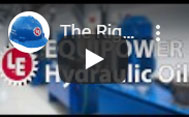To ensure smooth-running hydraulic systems, use the right hydraulic oil and keep it clean and dry.
A lubrication reliability effort that includes selecting the right fluid and implementing the correct reliability best practices will protect metal surfaces from wear. This in turn will lead to improved uptime, reduced maintenance costs, and longer lubricant and equipment life.
Hydraulic systems have become more sophisticated in recent years, as speed and pressure have increased tremendously. Because of these changes, wear rates have gone up dramatically. Thus, the proper selection of hydraulic oil has become much more important.
Hydraulic Oil Selection Considerations
Viscosity
- Select an oil that has the right viscosity and is able to maintain its viscosity throughout its working life.
- To maintain viscosity, an oil must be able to withstand oxidation, resist foam, separate from water, and withstand effects from temperature fluctuations.
Oxidation
- Oxidation rates increase with temperature, and as the percentage of contaminants in the system increases.
- The right oxidation inhibitors can help extend oil life and prevent costly changeouts.
Foam
- When present in hydraulic fluid, foam is normally a symptom of another problem.
- Foam also causes several issues, including oxidation, viscosity changes, cavitation, micro-dieseling, elevated temperatures, reduced film strength, increased oil compressibility, and varnish.
- Controlling foam is essential to hydraulic performance. Therefore, it is very important to select a fluid that will not foam in service.
Water
- Other than fire-resistant fluids, hydraulic oils should shed water quickly so the water can be removed.
- If water is not removed, emulsification will lead to equipment failure and performance loss.
Rust and corrosion
- With the right additive package, hydraulic oil will provide long-term protection from rust and corrosion.
Putting it all together
After selecting the right oil for the job, the next step is oil analysis. This allows you to begin predictive trending of oil and asset condition. After that, you should add filtration, breathers, and sight glasses. These solutions help you keep the oil clean and dry, enabling you to safely extend the life of the equipment and the oil.
Identify Suffering Points
Move forward with LE’s proven solutions for extending hydraulic component life.
Contamination
 Problem
Problem
Oil cleanliness is imperative to the reliable operation of hydraulic components. Typical contaminants include dirt, process material, wear debris and water. Contaminated oil leads to problems such as wear, corrosion, accelerated degradation of oil, sluggish operation, and component failures.
 LE Solution: Filtration
LE Solution: Filtration
Routine filtration is a simple way to extend oil and equipment life. In fact, achieving and maintaining the right ISO cleanliness standard for hydraulic applications can extend the life of the oil by two to three times. To help you with that, LE offers a line of high-quality filtration equipment.
Time-Based Oil Changes
 Problem
Problem
Changing oil on a time-based interval is wasteful and unnecessary. Instead, successful programs incorporate condition-based changes to minimize costs while ensuring efficient hydraulic performance.
 LE Solution: Oil Analysis Program
LE Solution: Oil Analysis Program
Our oil analysis program monitors oil samples for mechanical, operational, and environmental factors that can affect equipment and oil life. A good oil analysis program is integral to any successful lubricant reliability program. With it, you will be able to make informed decisions. You will have less lubricant to purchase, fewer parts to keep in inventory, less used lubricant requiring disposal, less labor, and less downtime. To summarize, you can improve your bottom line with consistent, accurate monitoring of the condition of your oil.
Underperforming Hydraulic Fluid
 Problem
Problem
OEMs typically recommend an ISO viscosity grade for hydraulic systems, while ignoring other characteristics. However, hydraulic fluids vary in many key properties that you should consider. These properties include thermal and oxidative stability, friction reduction capability, detergency, antifoam characteristics, demulsibility, hydrolytic stability, and ability to maintain viscosity across the temperature range.
When any of these properties are not up to the challenges the equipment and environment pose, they can compound challenges in other areas. Further, some applications or environments have specific requirements, such as fire resistance, food grade, environmental needs, and dielectric strength.
 LE Solution: Choosing the Right Hydraulic Oil
LE Solution: Choosing the Right Hydraulic Oil
With both system performance and equipment reliability affected by the lubricant, selecting the right fluid is of utmost importance. Working with a knowledgeable consultant who can help you select and maintain your hydraulic fluid can be the difference between a trouble-free operation and continuous problems. LE provides a range of hydraulic fluids for various applications and environments, all of which are engineered to provide the best protection for your equipment.
Lubrication Reliability Program
In conclusion, Lubrication Engineers can help put together a lubrication reliability program for your hydraulic applications to help them last longer, subsequently eliminating downtime and reducing maintenance costs.
Our certified lubrication experts can be onsite to help you put together a program. Start now by finding your local LE consultant or registering to purchase online.





